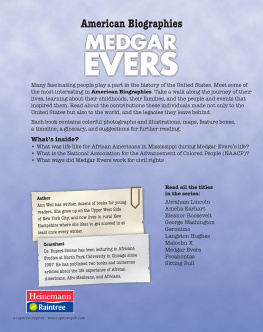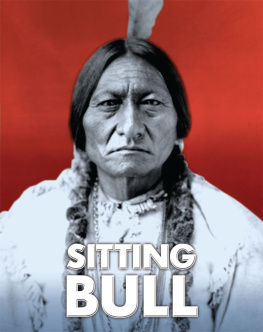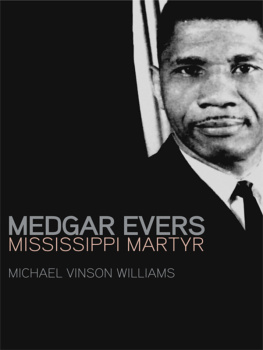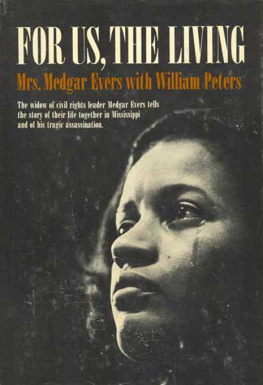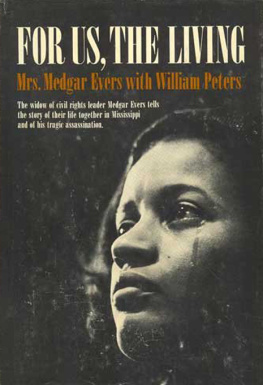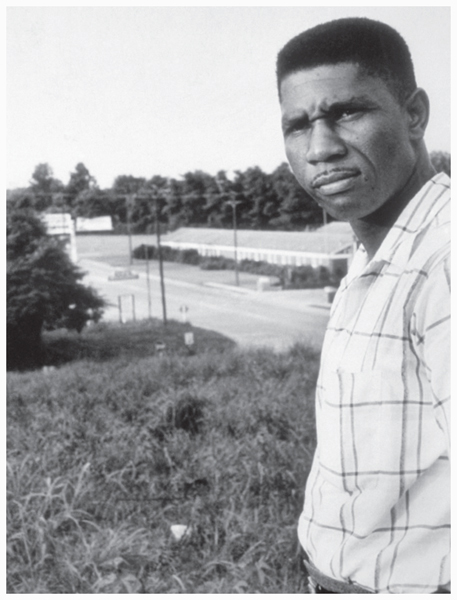Find Out More
Books
Bowers, Rick. Spies of Mississippi: The True Story of the Spy Network that Tried to Destroy the Civil Rights Movement. Washington, D.C.: National Geographic, 2010.
Coleman, Wim, and Pat Perrin. Racism on Trial: From the Medgar Evers Murder Case to Ghosts of Mississippi (Famous Court Cases that Became Movies). Berkeley Heights, N.J.: Enslow Publishers, 2009.
Nelson, Marilyn. A Wreath for Emmett Till. Boston: Houghton Mifflin, 2009.
Websites
www.NAACP.org
The NAACP
Website has information on the groups history and civil rights work.
http://pbskids.org/aaworld/index.html
African American World for Kids
Visit this website to learn more about important events in African American history.
http://pbskids.org/wayback/civilrights/features_school.html
School Desegregation
Learn about nine brave students who stood up against school segregation during the civil rights movement in 1957.
www.loc.gov/teachers/classroommaterials/themes/civil-rights/students.html
Civil Rights for Students
This Library of Congress website has information and primary source materials about the civil rights time period.
Places to visit
Medgar Evers Home Museum
2332 Margaret Walker Alexander Dr. Jackson, MS 39213
www.everstribute.org/index.php
Bronze Statue of Medgar Evers
4215 Medgar Evers Blvd.
Jackson, MS 39213
601-982-2867
www.discoverourtown.com/MS/Jackson/Attractions/bronzestatue-of-medgar-evers/176444.html
National Civil Rights Museum
450 Mulberry St.
Memphis, TN 38103
901-521-9699
www.civilrightsmuseum.org/
Brown v. Board of Education Historic Site
1515 SE Monroe St.
Topeka, KS 66612
785-354-4273
www.nps.gov/brvb/index.htm

www.capstonepub.com
Visit our website to find out more information about Heinemann-Raintree books.
To order:

Phone 888-454-2279

Visit www.capstonepub.com
to browse our catalog and order online.
2013 Heinemann Library an imprint of Capstone Global Library, LLC Chicago, Illinois
All rights reserved. No part of this publication may be reproduced or transmitted in any form or by any means, electronic or mechanical, including photocopying, recording, taping, or any information storage and retrieval system, without permission in writing from the publisher.
Edited by Abby Colich, Megan Cotugno, and Laura Hensley
Designed by Philippa Jenkins
Original illustrations Capstone Global Library Limited 2011
Illustrated by Oxford Designers and Illustrators
Picture research by Tracy Cummins
Originated by Capstone Global Library Limited
16 15 14 13
10 9 8 7 6 5 4
Library of Congress Cataloging-in-Publication Data
Medgar Evers / Ann Weil.
p. cm.(American biographies)
Includes bibliographical references and index.
ISBN 978-1-4329-6454-2 (hbk.)ISBN 978-1- 4329-6465-8 (pbk.)
ISBN 978-1-4846-1091-6 (eBook)
1. Evers, Medgar Wiley, 1925- 1963Juvenile literature. 2. African American civil rights workersMississippiJackson BiographyJuvenile literature. 3. Civil rights workersMississippiJacksonBiography Juvenile literature. 4. National Association for the Advancement of Colored PeopleBiography Juvenile literature. 5. Civil rights movements MississippiHistory20th centuryJuvenile literature. 6. African AmericansCivil rights MississippiHistory20th centuryJuvenile literature. 7. MississippiRace relationsJuvenile literature. 8. Jackson (Miss.)Biography--Juvenile literature. I. Title.
F349.J13W45 2012
323.092dc23 2011037578
[B]
Acknowledgments
The author and publishers are grateful to the following for permission to reproduce copyright material: akg-images: p. 13 (RIA Nowosti); AP Images: pp. 9, 17 (Rogelio V. Solis), 22 (Robert Jordan), 32 (Francis H. Mitchell/Ebony Collection), 37 (Jim Bourdier), 39; Corbis: pp. 10 ( CORBIS), 20 (Joseph Schwartz), 23 ( Bettmann), 26 ( Bettmann), 27 ( Bettmann), 34 ( Bettmann), 40 ( CORBIS); Getty Images: pp. 5 (Michael Ochs Archives), 15 (Ed Clark//Time Life Pictures), 25, 28 (Don Cravens/Time Life Pictures), 31 (PhotoQuest), 35 (FPG), 41 (Chip Somodevilla); Library of Congress Prints and Photographs Division: pp. 8, 12, 14, 16, 19; news.com: p. 33 (JAY CLARKE/MIAMI HERALD); The Granger Collection: p. 6.
Cover photograph of Medgar Evers reproduced with permission from Getty Images (Michael Ochs Archive).
Every effort has been made to contact copyright holders of material reproduced in this book. Any omissions will be rectified in subsequent printings if notice is given to the publisher.
Disclaimer
All the Internet addresses (URLs) given in this book were valid at the time of going to press. However, due to the dynamic nature of the Internet, some addresses may have changed, or sites may have changed or ceased to exist since publication. While the author and publisher regret any inconvenience this may cause readers, no responsibility for any such changes can be accepted by either the author or the publisher.
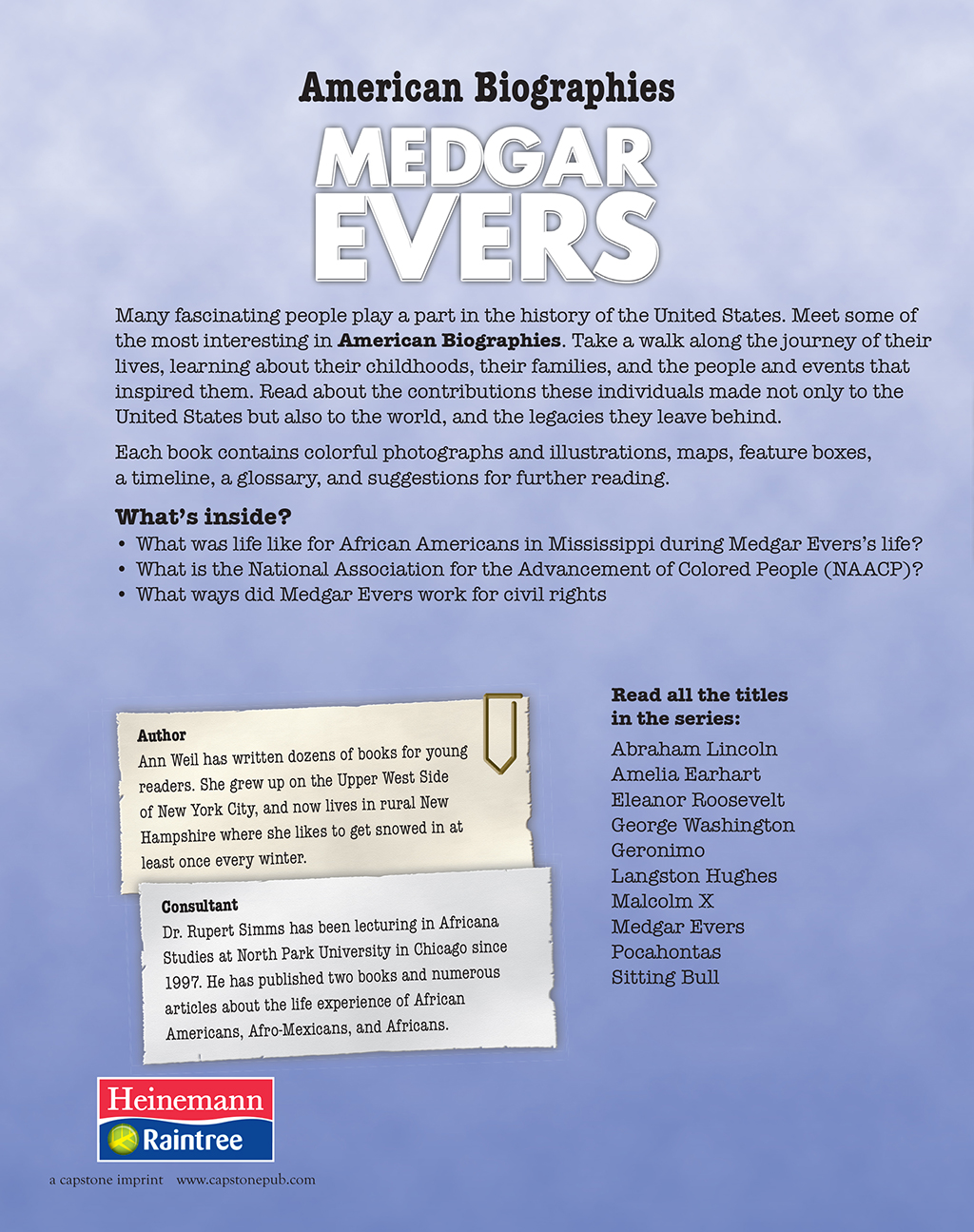
Contents
Some words are shown in bold, like this.
These words are explained in the glossary.
A Civil Rights Hero and Martyr
There are many heroes in U.S. history. These men and women risked their lives to make the country a better place for everyone. Medgar Evers was one of these heroes.
Mississippi: black and white
Evers was an African American, or black American, dedicated to the idea of racial justice, at a time when blacks in his home state of Mississippi were far from free. Black people had the legal right to vote. But men with guns blocked them from voting. Blacks could not sit at a public lunch counter. They could not swim at a public pool. All blacks were at risk of brutal attacks by white racists. In Mississippi a white man could kill a black man without fear of going to jail.
A fight for freedom
Medgar Evers showed extraordinary courage by speaking out against a system of inequality that so many took for granted. His work to secure voting rights for black people inspired fear and hatred among white extremists, who wanted to keep blacks in their place.
Evers knew that these people had put him on a death list in the 1950s. Still, he persisted in his work up until the day he was shot and killed outside his home in Mississippi on June 12, 1963. When Evers was assassinated, this made him one of the rst martyrs of the civil rights movement.
Medgar Evers once said, You can kill a man, but you cant kill an idea.
Growing Up in Mississippi
Medgar Evers was born on July 2, 1925, in Decatur, Mississippi. His family roots were in the area. Medgars fathers parents were freed slaves and owned land. His grandfather, Mike Evers, owned more than 300 acres (121 hectares) of land. But whites had used legal tricks to steal most of that land.

